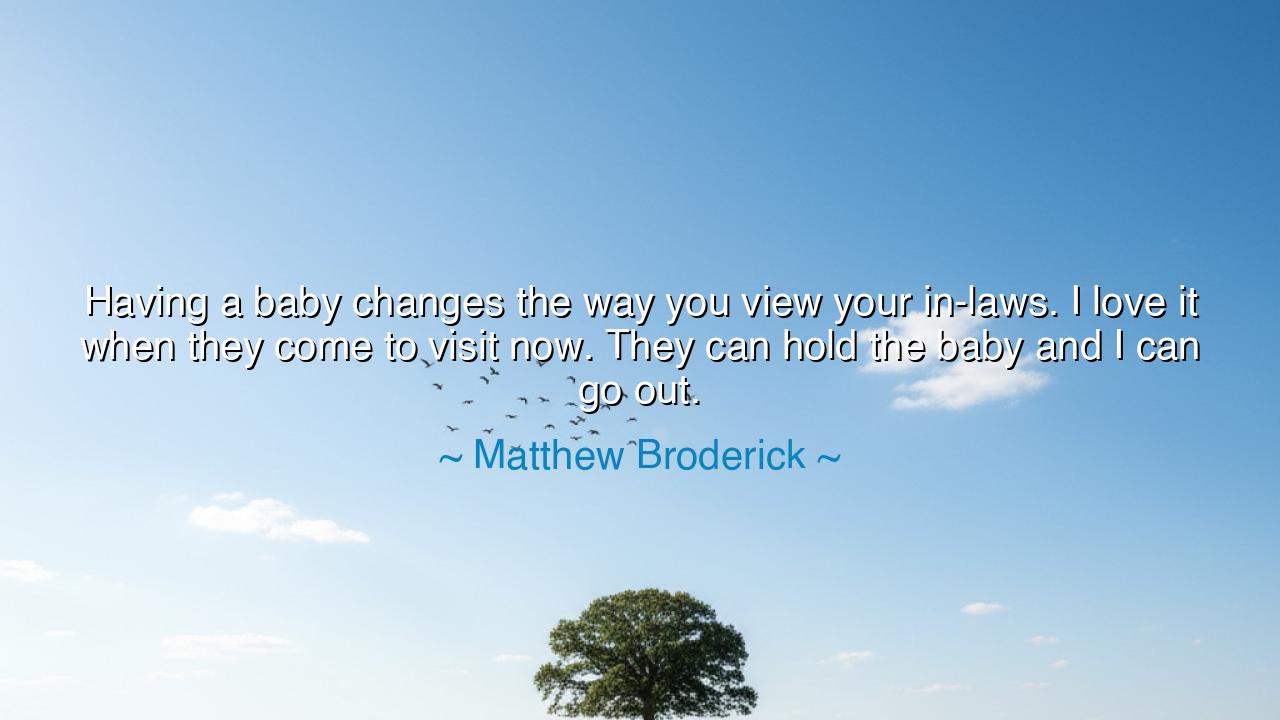
Having a baby changes the way you view your in-laws. I love it
Having a baby changes the way you view your in-laws. I love it when they come to visit now. They can hold the baby and I can go out.






The words of Matthew Broderick—“Having a baby changes the way you view your in-laws. I love it when they come to visit now. They can hold the baby and I can go out.”—are lighthearted, yet within them lies a wisdom older than empires. For he speaks of the transformation that parenthood brings: how the burdens of care reshape relationships, how the bonds between families deepen when a child enters the world. What once might have been merely courtesy or tolerance becomes gratitude and alliance, because the needs of the child call forth cooperation and shared love.
In the days of the ancients, the joining of families through marriage was not simply the union of two individuals, but the weaving together of clans, tribes, and bloodlines. Often, in-laws were seen as distant, perhaps even as rivals. Yet when a child was born, that rivalry softened into partnership. For the infant, fragile and precious, demanded many hands and many hearts. Broderick’s humor about “going out” while the in-laws hold the baby reflects this timeless truth: the coming of a child transforms in-laws into allies, companions in the sacred labor of raising the next generation.
Consider the example of the great Charlemagne, who wove alliances across Europe through both sword and marriage. His empire was not secured by armies alone, but by the shared responsibility of kin, bound together through children. When heirs were born, alliances deepened, for grandparents, uncles, and aunts all became invested in the continuity of the line. In this way, even distant kin became essential guardians of the child’s future. Broderick’s words echo this ancient principle: the baby unites where once there was division, and transforms obligation into joy.
What Broderick captures so playfully is also profoundly human: the arrival of a child brings humility. Parents, who may once have prided themselves on independence, now find themselves longing for help, grateful for the hands of others. In-laws, once peripheral, become indispensable. The vulnerability of parenthood reveals that none can raise a child alone. Thus, gratitude flows, and bonds are strengthened. What once might have been a strained visit becomes an eagerly awaited relief, a chance to rest, to breathe, to reclaim a moment of freedom.
The meaning is twofold: first, that parenthood alters our vision, teaching us to value what we once overlooked. And second, that children are bridges across divides, reconciling families through shared devotion. This is why across all cultures, newborns are celebrated not only by parents but by entire extended families. A child carries not just the name of their parents, but the hopes of grandparents, the joy of uncles and aunts, the pride of kin. Each feels invested, each feels necessary.
The lesson, then, is clear: welcome the hands that come to help. Do not cling to pride or independence so fiercely that you deny yourself the relief and connection others can offer. Parent with humility, knowing that the gift of family—especially extended family—can lighten the heaviest burdens. Just as ancient villages once raised children together, so too must modern parents remember that they do not walk this path alone.
Therefore, let your actions be these: embrace gratitude when family comes to help. Allow yourself rest, and allow others the joy of sharing in the child’s growth. See in your in-laws not intruders, but partners, whose bond with your child strengthens the web of love that sustains them. And when you are called upon, return that gift, holding the children of others so that they, too, may find rest.
Thus, Broderick’s words, though spoken with humor, become a torch of ancient truth: a child transforms not only the parents, but the whole family. Relationships once formal become tender, alliances once fragile grow strong. And in the laughter of grandparents holding their grandchild, in the sigh of parents finally finding a moment of freedom, we see the eternal cycle: that children are both burden and blessing, binding hearts together across generations.






AAdministratorAdministrator
Welcome, honored guests. Please leave a comment, we will respond soon